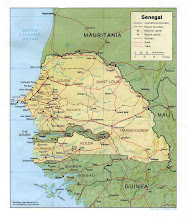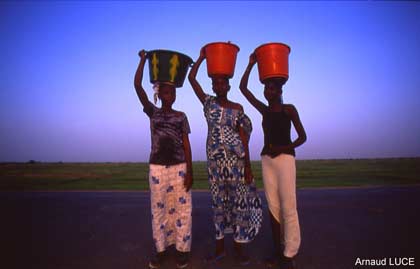In May 2007, the German Ministry of Economics and Technology (BMWi) offered German companies an opportunity to exchange thoughts and ideas with Senegalese partners and institutions. In addition to establishing contacts there, they were also encouraged to present initial business ideas and to develop them further with their partners.
In October 2008, Schott Solar in co-operation with its partners officially began the operation of a solar emergency power system installed with the village inhabitants for a hospital clinic in Baïla, located in Casamance province in southern Senegal.
The clinic in Baïla has an emergency room, a delivery room, 10 beds, a pharmacy and accommodation for family members. Previously, during power outages (not uncommon in Senegal), the staff had to make do with petroleum lamps and candles and, if there was any extra diesel available, the clinic was sometimes able to run a power generator until they were back on the grid.
In this first project, Schott Solar and SMA joined forces with Kaito Energie AG, which had been developing and investing in business-oriented projects in Casamance for several years.
The local electricity network is often overloaded and can sometimes cut off its service several times a day. A five-kilowatt solar power system was installed to supply the clinic with power when the regular network is down. The power from the solar modules is initially stored in batteries. If there is a power outage, the system switches over to a so-called mini-grid with virtually no interruption to maintain stable power, vital to the clinic.
To guarantee the energy supply, Schott Solar donated photovoltaic modules and inverter company SMA donated a ‘Sunny’ back-up system to the clinic in Baïla.
In addition to the solar modules, Schott Solar also provided the system technology and supported the assembly. The installation was completed by the company and its employees. Meanwhile, Kaito Energie AG took responsibility for project management on location and dealt with the local authorities. The village community built the building extension on which the system was installed.
On the roof of the clinic, 102 Schott Solar modules produce approximately eight kilowatt a year--any surplus is stored in batteries.
The modules were transported by ship via Dakar to the regional harbour in Ziguinchor in Casamance, and then taken overland to Baïla. In Casamance, located on the edge of the topical rainforest, climatic conditions are extreme with a great deal of rain.
Following the dry season from November to June, hot monsoon winds herald the rainy season and humid weather from the south. In order to maintain performance, special double-glazed modules were used, based on stainless steel frames which have stood up in Indonesia and Thailand since the late 1980s.
Schott Solar claims its modules meet standards twice that of the IEC 61215 standard: the modules are subjected to temperatures of +85°C and a humidity of 85 percent. During the so-called temperature change test, they have to hold their own against temperature cycles ranging from -40°C up to +85°C. In addition to the solar modules themselves, the power inverter also plays a major role for the operating efficiency and the performance of a solar energy system.
People living in Baïla were also directly involved in the installation of the system. The village community built the extension on which the employees of the project partners mounted the system in May. Trainees from the neighbouring technical college worked with experts from Germany and helped to install the modules on the roof.
German engineering, always awesome to see...
Subscribe to:
Post Comments (Atom)



No comments:
Post a Comment